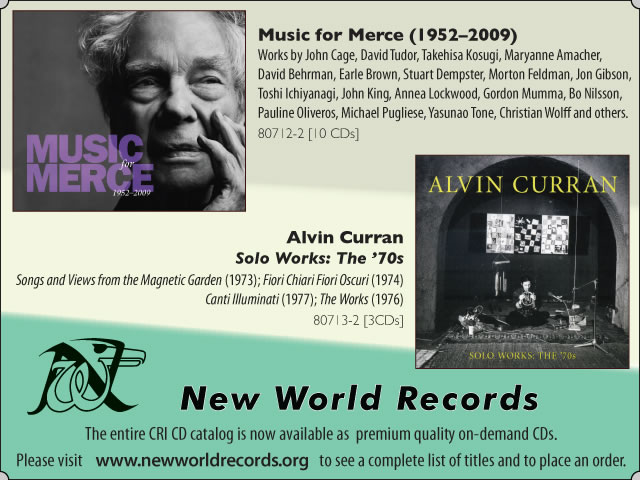Moment's Notice
Reviews of Recent Recordings
(continued)
Jason Adasiewicz
Sun Rooms
Delmark 593
James Falzone's Allos Musica
Lamentations
Allos Documents
Aram Shelton Quartet
These Times
Single Speed Music 007
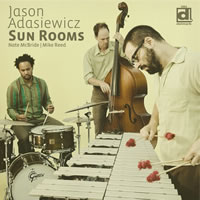

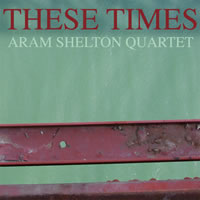 Three more CDs from Chicago's 21st-century outside-jazz community. Does any other jazz center in the world have a new-jazz/free-improvisation scene as actively and intensely creative as this? The essential element is community – the fact that these diverse artists are working together every week is a great stimulus.
Three more CDs from Chicago's 21st-century outside-jazz community. Does any other jazz center in the world have a new-jazz/free-improvisation scene as actively and intensely creative as this? The essential element is community – the fact that these diverse artists are working together every week is a great stimulus.
Sun Rooms is a rare trio CD that's further across the inside-outside border than the last vibes-bass-drums LP I know: Al Francis's obscure but ingenious Jazz Bohemia Revisited, from 1987. Jason Adasiewicz, who played drums in boyhood, now waves his hard mallets in the air, then crashes them on the metal bars of his vibes -- no soft-pad, Red Norvo-type gentleman, he. I must say, Adasiewicz likes the best kind of modern pianist-composers. There's a hint of Thelonious Monk in some songs he wrote for the date – for instance, "Life" suggests "Bemsha Swing" got revised by Dudu Pukwana; the descending notes in "Rose Garden" suggest "Ask Me Now" – and the opener "Get In There" evokes Herbie Nichols in its dramatic figures. Along with the originals are songs by Hassan Ibn Ali, Sun Ra, and Duke Ellington, three more from jazz piano's heroic left wing.
Adasiewicz almost always works in larger groups as a sideman. Maybe because of this trio's intimacy, this CD is the best, most revealing improvising I've heard from him. He plays distantly from or outside the chord changes and he likes to phrase in chords. His foot is heavy on the sustain pedal, which makes his sound distinctive, long-ringing. He likes to phrase in four-mallet chords, and his aggressive attack and sustained sound sometimes smooth out what are actually angular phrases. His affection for bass-clef chords and lines lend darkness to his art; altogether he's as far from the Bags model as he is from Gary Burton. His reinterpretation of "Warm Valley" is moving, but there's also a compelling intensity about Adasiewicz's solos elsewhere on the album, a determination to investigate the depths of his discoveries no matter how dangerous. "You Can't" is a fine example as he slips in and out of changes. That piece has a tense, nervous, forceful bass solo by Nate McBride, a good, true summary of his style. Mike Reed is the fine drummer.
James Falzone is a Puritanical, maybe fragile artist. He plays clarinet with a classical tone and in Lamentations he plays piano with a minimum of expression. He much prefers low and middle registers. On CDs he's usually in intimate settings, like this trio with Ronnie Malley, oud, and Tim Mulvenna, percussion. These tracks are his adaptations of Arabic modes and forms. The laments and even the non-lament pieces yield an emotional monotone. A few are winding, unison, Arabic, or Arabic-like, melodies, the rest are slower pieces in long, sad tones. Falzone's faster clarinet playing sounds to me like noodling. His others, which are in long tones, sometimes with little melismatic grace notes between phrases, are just not very melodic. How much is composed, how much improvised? Not much variety here, especially from one long-tone solo to another.
Of course the oud is a wonderful instrument: deep, lovely resonances. Malley's oud playing includes hints of flamenco, Indian, and Greek musics, and why not? His few solos and one vocal sound livelier than Falzone's austerity. Mulvenna mostly plays catchy, intricate patterns on a frame drum – another wonderful instrument -- and once in a while gets to provide color with bells. Nine short tracks are cool clarinet improvisations over frame drums. Falzone is stone earnest about his Arabic-music venture, but compare this CD's understatement to the brightness of trumpeter Amir ElSaffar's recent parallel CDs.
Aram Shelton (alto sax, clarinet) moved to the SF Bay area in 2005 but still returns to Chicago to create with old partners. Like Shelton, Keefe Jackson (tenor sax) is a virtual model of saxophonists who compose as they improvise. These are important, no-bullshit artists who recall Prez's rule that a solo should tell a story. Throughout the disc both of them use Ornette Coleman's motive-evolution way of building solos. They avoid the pitfalls of this structuring because they both have good feelings for improvised drama. They're fortunate to have Anton Hatwich, who plays bass with a lovely sound, a bold resonance and unequivocal note definition, and note choices that seem to inspire. And the drummer, Marc Riordan, accompanies sensitively with different sound colors for each of the six tracks.
Shelton composes prolifically, he likes several themes, several tempos, or several re-combinations of instruments in his pieces. "Dusk" has a theme that quacks like Steve Lacy's various "Ducks"; Shelton's solo (clarinet) then begins rubato and tells his story with especially liberated ebb-flow of rhythm; Jackson twists like no other tenorist, mainly in his lower ranges. "An Interrupted Stroll" has especially lyrical solos, Shelton again on clarinet. These two irritate each other well. In the title track Shelton (alto) extends a little trill into broken, wounded variations that narrow into a repeated note. By contrast Jackson is expansive; he stretches a repeated lick into a long line that's just as closely sustained, with no excess. There's a lot of intrigue about the interplay on These Times. Shelton also records prolifically and if you're not familiar with his music, do hear his and Jackson's Fast Citizens CDs on Delmark.
–John Litweiler
Lina Allemano Four
Jargon
LM 2010-4
 Some recordings test reviewers’ reflexes more than others. Jargon, the third by the Lina Allemano Four, is one of them, evidenced by the nearly universal front-loading of references to the classic Ornette Coleman quartet in initial reviews. Certainly, the bustling energy of the tartly named opening piece, “Cannonball Adderley Tattoo,” the bounce of “Sling Slang” and the appealingly loose rapport between the Toronto-based trumpeter, alto saxophonist Brodie West, bassist Andrew Downing and drummer Nick Fraser is more than sufficient to elicit the OC reflex. But, there’s arguably a larger, more contemporary shadow Allemano has to sidestep – Dave Douglas’. Certainly, Douglas’ impressively diverse portfolio is largely far afield from Allemano’s agenda with her Four; but Douglas’ work with his ‘90s Magic Triangle quartet is quite germane, even though Chris Potter played tenor in the band. Douglas brought a rare facility to this configuration; instead of approximating Coleman’s slyly shambling ensembles, Douglas’ trademark precision as a trumpeter and his writing’s smart phrase-turning set a rather polished high bar, one from which a trumpeter-composer could easily slip. Allemano responds well to the challenge, triangulating the vocabularies of the two composers with the languid blues feel of “Water” and the hushed long tones and pensive four-note motive upon which “Puddle” is built. Allemano’s admirable restraint, West’s breathy, occasionally nappy tone and the finely calibrated support of Downing and Fraser on both tracks impressively suggest that Allemano and her cohorts know how to create winning performances from small details and understatement. Subsequently, when the quartet heats up and moves outside on “Guadalajara” – its emphatically accented theme is the date’s most Douglas-like passage – their exchanges vault way above the generic flailing that too often currently passes for four-star jazz. These moments are also where the comparison to Coleman’s quartet is most apt, but it still falls short, as foundational materials bear little to no resemblance to Coleman’s. Still, Allemano, whose playing can grab listeners by their collars just as surely as it can insinuate itself in more lyrical moments, imbues the date with a this-is-our-music confidence that is infectious. Her command of the proceedings is also measured by the running time of this impeccably sequenced album – at a daringly scant 40 minutes, she leaves the listener wanting more.
Some recordings test reviewers’ reflexes more than others. Jargon, the third by the Lina Allemano Four, is one of them, evidenced by the nearly universal front-loading of references to the classic Ornette Coleman quartet in initial reviews. Certainly, the bustling energy of the tartly named opening piece, “Cannonball Adderley Tattoo,” the bounce of “Sling Slang” and the appealingly loose rapport between the Toronto-based trumpeter, alto saxophonist Brodie West, bassist Andrew Downing and drummer Nick Fraser is more than sufficient to elicit the OC reflex. But, there’s arguably a larger, more contemporary shadow Allemano has to sidestep – Dave Douglas’. Certainly, Douglas’ impressively diverse portfolio is largely far afield from Allemano’s agenda with her Four; but Douglas’ work with his ‘90s Magic Triangle quartet is quite germane, even though Chris Potter played tenor in the band. Douglas brought a rare facility to this configuration; instead of approximating Coleman’s slyly shambling ensembles, Douglas’ trademark precision as a trumpeter and his writing’s smart phrase-turning set a rather polished high bar, one from which a trumpeter-composer could easily slip. Allemano responds well to the challenge, triangulating the vocabularies of the two composers with the languid blues feel of “Water” and the hushed long tones and pensive four-note motive upon which “Puddle” is built. Allemano’s admirable restraint, West’s breathy, occasionally nappy tone and the finely calibrated support of Downing and Fraser on both tracks impressively suggest that Allemano and her cohorts know how to create winning performances from small details and understatement. Subsequently, when the quartet heats up and moves outside on “Guadalajara” – its emphatically accented theme is the date’s most Douglas-like passage – their exchanges vault way above the generic flailing that too often currently passes for four-star jazz. These moments are also where the comparison to Coleman’s quartet is most apt, but it still falls short, as foundational materials bear little to no resemblance to Coleman’s. Still, Allemano, whose playing can grab listeners by their collars just as surely as it can insinuate itself in more lyrical moments, imbues the date with a this-is-our-music confidence that is infectious. Her command of the proceedings is also measured by the running time of this impeccably sequenced album – at a daringly scant 40 minutes, she leaves the listener wanting more.
–Bill Shoemaker
Rodrigo Amado
Searching For Adam
Not Two MW 837-2
 The piano-less quartet has enjoyed a long and fruitful existence in the annals of Post-War jazz. Malleable and dynamic, this bare bones instrumentation continues to provide artists around the globe with a wealth of expressive possibilities, evidenced by saxophonist Rodrigo Amado’s Searching For Adam.
The piano-less quartet has enjoyed a long and fruitful existence in the annals of Post-War jazz. Malleable and dynamic, this bare bones instrumentation continues to provide artists around the globe with a wealth of expressive possibilities, evidenced by saxophonist Rodrigo Amado’s Searching For Adam.
For this date, Amado, whose recordings for Clean Feed and his own European Echoes label have positioned him at the forefront of the burgeoning Portuguese jazz scene, recruited cornetist Taylor Ho Bynum, bassist John Hébert and drummer Gerald Cleaver. Their empathetic rapport lends this spontaneous studio session a sense of coherence often missing in similar efforts.
Amado quotes Sam Rivers in the liner notes: “Freedom does not mean unconditional renunciation of melody and rhythm, but the freedom of being able to choose what I want to play.” Embracing this edict, Amado and company infuse their harmonically unfettered improvisations with a formidable rhythmic acuity, providing even their most ruminative explorations an undercurrent of forward momentum. “Renee, Lost In Music” typifies this approach, progressively escalating from languid introspection to blistering free-bop.
Invoking venerable traditions, the ensemble’s swinging interplay recalls Sonny Rollins’ mid-sixties piano-less quartet with Don Cherry. Amado’s burly tone and incisive linear phrasing make a rich, contrasting foil to Bynum’s wooly timbre and abstract impressionism, reinforcing the Rollins/Cherry connection. Beyond his fractured lyricism, the ghostly tenor wails Amado briefly unleashes on the spry opener, “Newman’s Informer” draw a further parallel to Rollins’ vanguard efforts, recalling his spectral altissimo accompaniment to Coleman Hawkins on their legendary 1963 collaboration Sonny Meets Hawk (RCA) and the otherworldly screeds of 1966’s East Broadway Rundown (Impulse!).
Amado and Bynum’s combative discourse dominates the album’s epic 21 minute centerpiece, “Waiting For Andy,” setting Amado’s plangent long tones against Bynum’s splintery salvos. Veteran rhythm section partners Hébert and Cleaver underscore this volatile front-line with adroit interplay, working in subtly shifting rhythms and vacillating tempos throughout the session. The closer, “4th Avenue, Adam’s Block,” reveals the depth of the quartet’s abilities, testing their mettle in a series of deconstructed episodes that borrow liberally from the blues and bop. Culminating in an elegiac coda of hushed tones and delicate accents, the record concludes with a tenderness rarely heard in spontaneous meetings of this nature, reinforcing the viability of the piano-less quartet as a tradition of endless sonic potential.
–Troy Collins
The Ray Anderson-Marty Ehrlich Quartet
Hear You Say: Live in Willisau
Intuition INTCHR71303
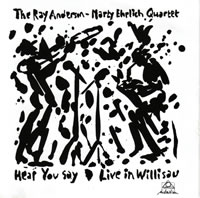 Joy grows larger when it’s shared, just as sorrow is diminished. And the quartet co-led by trombonist Ray Anderson and multi-instrumentalist Marty Ehrlich was ready to share their joy during their boisterous set at the 2009 Willisau Jazz Festival. It explodes out of their instruments, growing stronger and deeper as they play, making this one of the most ebullient albums of the year.
Joy grows larger when it’s shared, just as sorrow is diminished. And the quartet co-led by trombonist Ray Anderson and multi-instrumentalist Marty Ehrlich was ready to share their joy during their boisterous set at the 2009 Willisau Jazz Festival. It explodes out of their instruments, growing stronger and deeper as they play, making this one of the most ebullient albums of the year.
This quartet with bassist Brad Jones and drummer Matt Wilson is the first that Anderson and Ehrlich have led together, although they have worked in the other bands before, including Bobby Previte’s Bump the Renaissance and with Anthony Braxton, among others. They are utterly different players in many ways, but the contrasts only make the music richer and the obvious delight each takes in the other’s playing only adds to the band’s overall sense of bonhomie.
Anderson always stands ready to blow open a melody, plump each note until it bursts, turn each whisper into a scream. He tempers his impish, unruly tendencies with a fondness for songlike melody and funky riffs, but his solos still have an unpredictable edge. His solos on “The Git Go” and “Alligatory Rhumba” and the title track are exuberant demonstrations of the efficacy of excess and high feeling. Ehrlich, on the other hand, never met a melody he couldn’t elaborate on, extend and transform. He is more focused and linear than the digressive Anderson. The harder he bears down, the more freely lyrical his solos grow, delivering the virtues of song into the midst of abstraction and formal complexity. His solo on “Hot Crab Pot” is tightly constructed, but fluid and free to veer off in pursuit of a passing idea before returning to the main thrust of music. His clarinet solo on “The Git Go” strays far from the initial tempo of the tune and its dramatic tension lies in how he works his way back. Although timbre and texture play a larger role in Anderson playing, Ehrlich knows how to pepper his essentially tuneful improvisations with cries and wails that heighten their emotional impact. Jones swings the music without ever falling into conventional bass playing, finding imaginative ways to mark or imply the time, create melodic supportive lines, or break up the time as the situation demands. In many ways, Matt Wilson is an ideal drummer for the coleaders, a drummer with a keen sense of melody that suits Ehrlich and with a loosey-goosey mischievousness that conspires with Anderson. A very strong outing for the two leaders and an album that’s just about impossible to resist.
–Ed Hazell
Derek Bailey
More 74
Incus
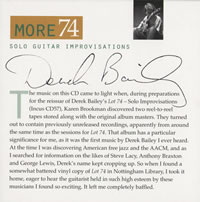 Bailey’s 1974 solo recording Lot 74 has long represented one of the high points of his solo improvising; More 74 consists of contemporaneous material, much of it apparently from the same session, that Karen Brookman found while preparing Bailey’s Lot 74 for reissue. The 22-minute title piece of Lot 74 was evidently the third version of a long improvisation: 7 of More 74’s 13 tracks likely represent the two earlier versions.
Bailey’s 1974 solo recording Lot 74 has long represented one of the high points of his solo improvising; More 74 consists of contemporaneous material, much of it apparently from the same session, that Karen Brookman found while preparing Bailey’s Lot 74 for reissue. The 22-minute title piece of Lot 74 was evidently the third version of a long improvisation: 7 of More 74’s 13 tracks likely represent the two earlier versions.
At the time Bailey was working extensively with his amplified archtop guitar connected to two volume pedals, permitting sudden shifts and degrees of volume, whether cutting off a sound’s attack or decay, reshaping its envelope, muffling an aggressive attack or suddenly pressing quiet passages or near-ambient sound to the point of feedback. Bailey possessed both a mastery of conventional guitar methodology and a host of personal techniques, from playing below the bridge to harmonic glissandi. His improvising consisted of breaking up linear continuity with a constant alteration between methods of sound production, from conventionally fretted notes to string scrapes and harmonics to broken arpeggios and sudden waves of scales, all of it compounded by the further disorientation of the stereo volume pedals. The effect of the longer improvisations here is of a continually variegated thread of sonic events, occasionally suggesting a theme (the CD starts with the likely second version of “Lot 74” which seems to explore the melody of “Without a Song”) or a rhythmic figure touched on, briefly repeated, then expanded beyond recognition. One follows these by surrendering expectation repeatedly, refusing to accept unquestioned its apparent orderings (or lack of them) and then surrendering expectation again, until one is left oddly outside of time.
Apart from the major journeys here (called “Catford parts 1-3” and “Probably parts 1-4”) there are several shorter pieces, including a sequence with Bailey exploring his “19-string (approx) acoustic guitar” with its loose bass slaps and pinging, unpredictable highs. Over an hour in length, this is a substantial representation of one of the great improvisers in a significant creative period, enriching our audition and offering alternatives to a major work; it’s as stimulating now as the day it was recorded.
–Stuart Broomer
